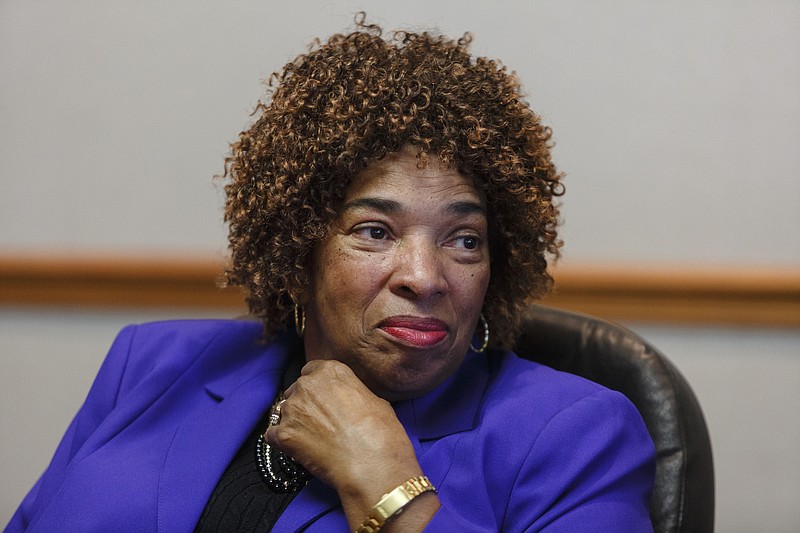NASHVILLE - State Rep. JoAnne Favors' legislation requiring safety belts on all Tennessee school buses by mid-2023 would cost the state an estimated $58.7 million and local governments $423.4 million, according to a new legislative fiscal analysis made public on Monday.
And that had representatives at a "pre-meeting" of the House Transportation Subcommittee Monday afternoon taking a collective deep breath over the Chattanooga Democratic lawmaker's attempt to address school bus safety.


Favors introduced the bill after the Nov. 21 crash of a Woodmore Elementary School bus that killed six students.
"It's a big, big cost," noted Chairman Terri Lynn Weaver, R-Lancaster, as members of her subcommittee looked at the fiscal advisory prepared by the General Assembly's Fiscal Review Committee.
A 2015 bill, introduced as a result of a school bus crash involving fatalities, also had a high estimated cost but not quite as large as Favors'.
But retrofitting existing buses with seat belts won't work because they aren't built for that. So the 79 percent of Tennessee school buses without the restraints would have to be discarded for new ones over the six-year period before the deadline.
The transportation panel took no official action at the pre-meeting, which Favors didn't attend due to an East Tennessee hearing by the special Opioid Task Force on which she sits.
Her bill is scheduled to come up Wednesday during the Transportation Subcommittee's official meeting.
"Well," Favors acknowledged later, "that fiscal note will probably weigh heavily on [lawmakers] whether or not it passes out of the subcommittee."
She said she isn't giving up and wants the panel to allow testimony from a local physician and others coming to speak on behalf of the legislation.
Two similar bills have failed in the past decade based on costs and ensuing opposition from school districts and local governments.
After Monday's late afternoon meeting, Weaver said she believes school bus seats are already constructed to provide safety to students.
"More of us think it would be more dangerous to children [wearing seat belts] if you have an accident," Weaver said. "What if some of these kids, if the seat belt won't release, and they're in there and then you got to get those kids out?"
David Connor, executive director of the Tennessee County Services Association, said that although he had not yet seen the fiscal note, "that kind of cost is going to raise some concerns."
The bill requires that any bus ordered or purchased as of July 1, 2018, for the purpose of being owned, operated, or leased by a public or private school to transport students to and from school or extracurricular or other activities be equipped with a restraint system approved by the National Transportation Safety Board.
The NTSB investigated Chattanooga's Nov. 21 bus crash in which Johnthony Walker, 24, has been indicted on vehicular homicide, reckless driving and reckless endangerment charges.
NTSB officials have not issued their report. At this juncture, it's not known whether seat belts would have helped, given the extensive damage to the bus.
Walker, a driver for Hamilton County Schools' private contractor Durham School Services, allegedly had been speeding on a curvy section of Talley Road in the Brainerd section of town.
Some parents had complained about Walker's previous behavior and driving and multiple lawsuits have been filed. Durham officials say nothing alarming in Walker's personnel file or record with the company had merited termination before the crash.
According to Fiscal Review analysts:
* The estimated $11.47 million annual cost increase to the state would begin in Fiscal Year 2018-2019 and continue through fiscal 2023. That money would go to state school districts under the transportation portion of the state's education funding formula.
* Analysts expect local expenditures would begin in FY 2017-2018 and amount to $70.56 million annually.
* The fiscal note says that based on NTSB's Federal Motor Vehicle Safety Standards, information from the Tennessee Department of Safety and Comptroller Justin Wilson's office, buses that were not originally designed to contain an occupant restraint system and are retrofitted with one would not be re-certified as being safe according to the manufacturer original body build date safety specifications.
"Therefore," the fiscal note says, "it is assumed that such buses will not be approved by NTSB, and will not be retro-fitted with seat belts."
As a result, local districts and contractors would be buying new buses, the fiscal note assumes. The average $100,000 cost of a bus would increase by $10,000, analysts said, and buses equipped with seat belts would carry fewer students than they do now.
* According to the state Department of Education's FY15-16 Annual Statistical Report, there are 9,112 school buses in Tennessee, 6,362 of which, or 70 percent, are district owned.
* The FY15-16 education report says 1,885 buses - about 21 percent - already have a restraint system. If the current law isn't changed, that percentage is expected to remain constant.
Some districts already require seat belts on buses. Analysts figure 70 percent are owned by school districts, which works out to 1,320.
* The fiscal note says it is "assumed that privately-owned bus companies will absorb 10 percent of the cost from adding restraints to the bus fleet."
Contact Andy Sher at asher@timesfreepress.com or 615-2550. Follow him on Twitter @AndySher1.
